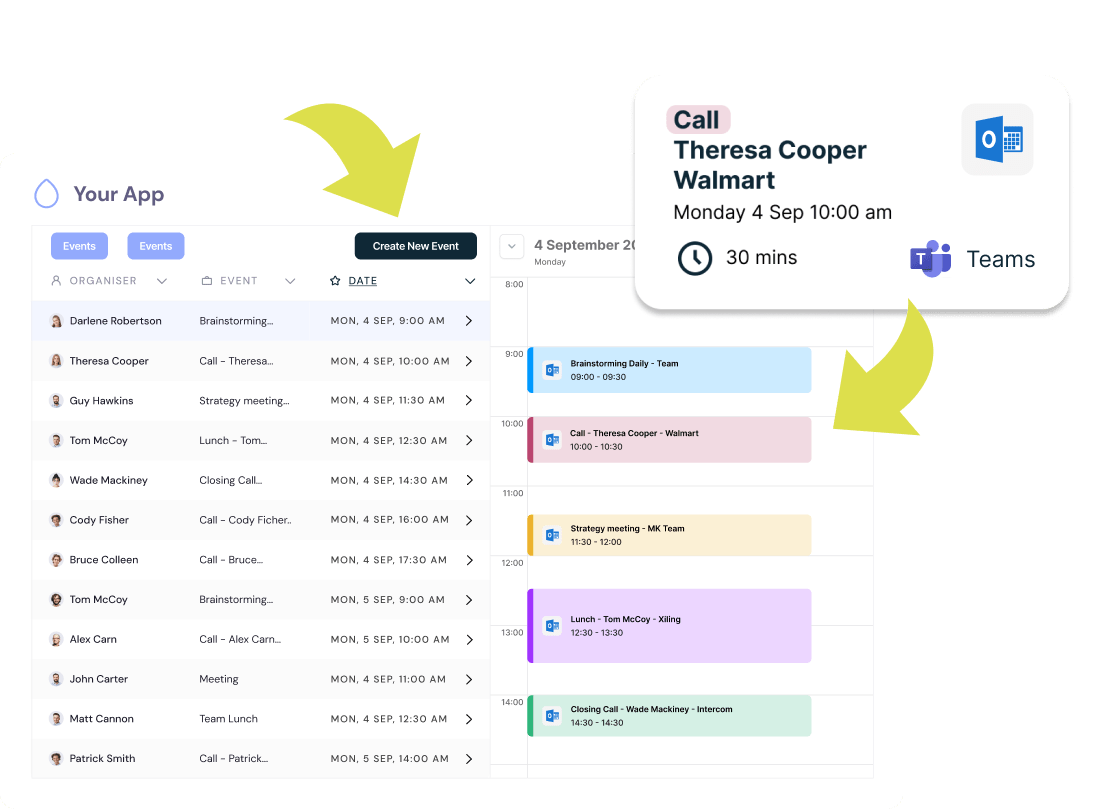Easily coordinate meetings, sync calendars, and boost productivity by integrating Outlook Calendar into your application.
The Outlook Calendar API provides developers with robust tools to create, retrieve, update, and manage calendar events programmatically within Microsoft 365 environments. Detailed insights and guidance can be found in the official Outlook Calendar API documentation. Whether you’re building a CRM, a productivity tool, or a recruitment platform, integrating Outlook Calendar can significantly boost scheduling capabilities and streamline operations.
Key Features of the Outlook Calendar API
- Event Management: Create, edit, delete, and search events with support for time zones and recurrence rules.
- Real-Time Sync: Automatically reflect changes made in Outlook across your app with webhook subscriptions.
- Availability Checks: Use “findMeetingTimes” and “getSchedule” endpoints to suggest optimal meeting times.
- Multi-calendar Access: Interact with primary and shared calendars, including group or team schedules.
- Permissions Management: Fine-tune access rights using delegated or application permissions.
Common Use Cases
1. CRM and Sales Platforms
Automatically sync sales meetings, follow-ups, and calls to users’ Outlook Calendars. This ensures no opportunity is missed and provides a seamless user experience.
2. ATS and Recruitment Tools
Coordinate interviews and send real-time calendar invites to candidates and interviewers directly from your application.
3. SaaS Productivity Tools
Allow users to view and manage their daily agenda or create shared team calendars to better organize project milestones.
4. Customer Support & Success Tools
Enable clients to book support calls or onboarding sessions directly based on available time slots in integrated Outlook Calendars.
How to Access the Outlook Calendar API
You can access the API through the Microsoft Graph, using standard RESTful calls. Authentication is handled via OAuth 2.0. You’ll need to register your app in the Azure portal to obtain the necessary credentials.
Main Endpoints Include:
- GET /me/calendars
- GET /me/calendar/events
- POST /me/events
- GET /me/calendarview
Simplify Integration with a Unified API
Rather than building custom logic for Outlook alone, consider using a unified Calendar API for developers like the one offered by Unipile. It supports Outlook, Google Calendar, and more through a single interface, saving development time and reducing maintenance overhead.
Unipile’s unified API simplifies complex calendar integrations, offering consistent endpoints and smart features like availability checks, multi-timezone support, and error handling across all platforms.
Benefits of Using Unipile
- Unified Access: Integrate once, access all major calendar platforms.
- Developer Friendly: Clear documentation, SDKs, and responsive support.
- Scalable: Designed for apps of all sizes, from startups to enterprise platforms.
- Secure: Compliant with SOC 2 and GDPR standards.
FAQ: Outlook Calendar API
1. How do I get started with Outlook Calendar API?Register your app on the Azure portal, use OAuth 2.0 for authentication, and make REST calls via Microsoft Graph.
2. Can I access shared calendars?Yes, the API allows access to shared and group calendars with appropriate permissions.
3. Is real-time synchronization possible?Yes, using Microsoft Graph’s webhook subscriptions, you can get notified of changes instantly.
4. Does the API support recurring events?Yes, it supports complex recurrence patterns and updates to series or individual instances.
5. What’s the rate limit for the API?Microsoft imposes rate limits based on the application and user level; check their documentation for specifics.
6. Why use Unipile instead of direct Outlook integration?Unipile provides a unified calendar API that saves development time and ensures consistent integration across Outlook, Google Calendar, and others.






